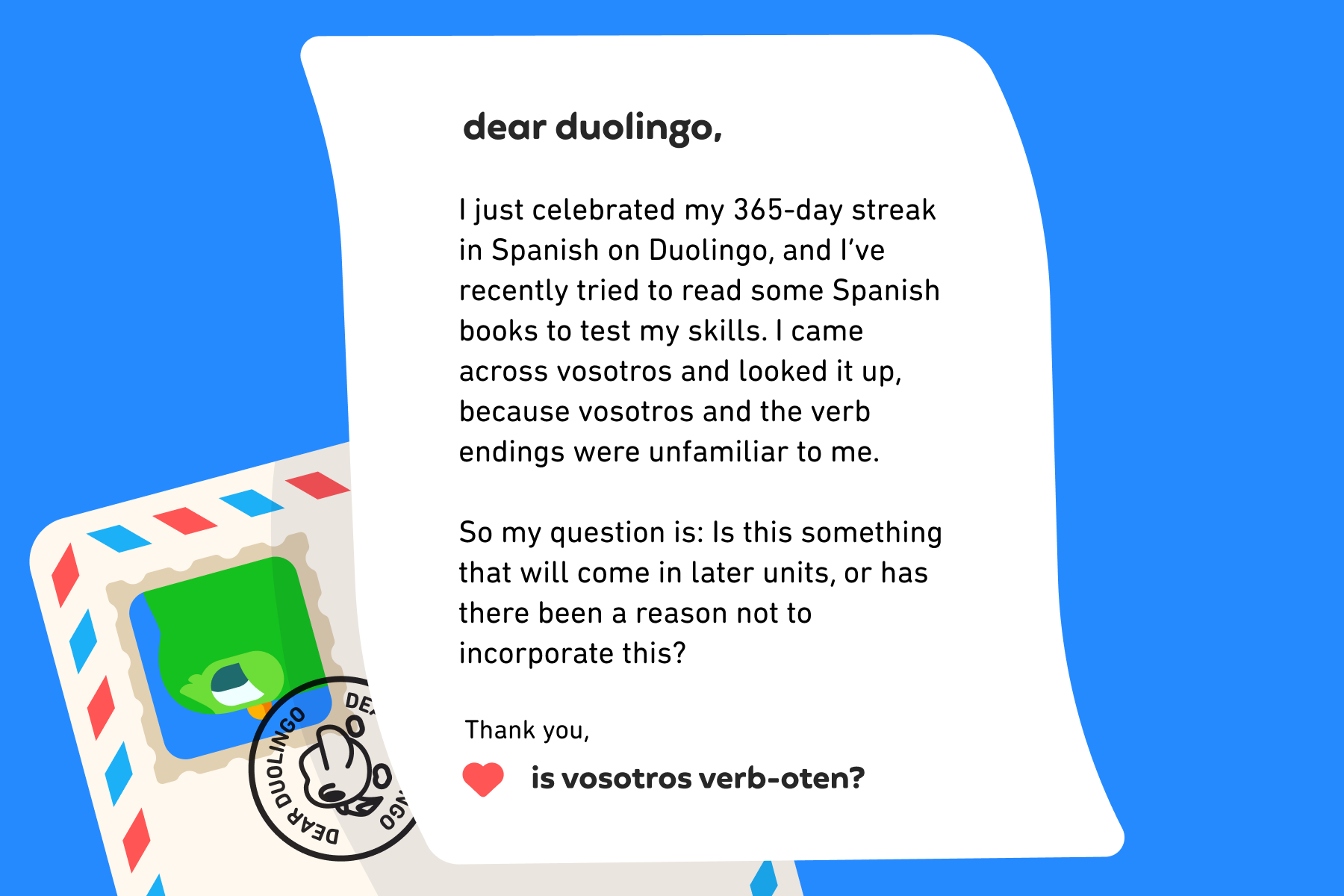Welcome to another week of Dear Duolingo, an advice column just for language learners. Catch up on past installments here.
We’re back this week with another learner-inspired Dear Duolingo post! We’ve gotten a number of similar questions about this topic, and it’s one I remember thinking about a lot, when I first traveled to Spain:
This week’s question:

Ahh, vosotros—that’s the form of “y’all” used in Spain! What is it, why is it there, and do you need to know it?
When I studied Spanish in school in the U.S., one year we needed to know vosotros and the next we didn’t, and it was always back and forth like that. You’d sort of see it in textbooks, but it was often skipped, and I was mostly told to ignore it… and then I studied abroad in Spain.
Today we’ll get into Spanish verb forms and how vosotros fits in. It’ll be a quick tour through pronouns, etymology, and Spanish dialects!
Ok, ¿estáis listos? (That’s the Spain verb form for “ok, are y’all ready?”)
Pronouns 101
To understand what vosotros is in English, first let’s review what pronouns are and how they work in English and Spanish (and in many other European languages).
Pronouns like vosotros replace a noun, and languages have different pronouns for different linguistic situations. In Spanish and many European languages, there are basically six slots for types of pronouns, and here they are in English:
| Singular | Plural | |
|---|---|---|
| First person | I | we |
| Second person | you | you |
| Third person | he / she / it | they |
Now, there’s something a little weird in that English pronoun chart: English has the very same word—“you”—for referring to just one person and for talking to a group of people. That’s because of some very old, very gradual changes in the history of English, and over time English dialects around the world have evolved to solve this problem, by creating new second person + plural pronouns, to be different from singular “you”: Irish English often uses ye (a very old pronoun!), many English speakers say you guys, you’ll hear youse in parts of the northeastern U.S., y’all is used in many regional and ethnic dialects across the U.S., and in Duolingo’s hometown of Pittsburgh, you might hear yinz!
Spanish has a parallel six-slot pronoun chart that you might have seen used for verb conjugations. Here’s the full chart, including all six pronouns, as they are used in Spain:
| Singular | Plural | |
|---|---|---|
| First person | yo | nosotros / nosotras |
| Second person | tú | vosotros / vosotras |
| Third person | él / ella | ellos / ellas |
As you can see, vosotros (and the feminine form vosotras) are in the same slot as plural you (or y’all, or youse, or yinz).
So…why doesn’t everyone learn vosotros in Spanish? And why is it only used in Spain?
What about usted?
English pronouns have the oddity that “you” has two meanings, and Spanish pronouns have a different complicating factor: formality.
Spanish and many other languages have special pronouns used when you have to show extra politeness to someone, maybe because they are a stranger, they’re older than you, or they are in a position of power, like a professor or judge. So in Spanish, to talk to your best friend you’ll use tú (informal “you”), but to talk to your sweet, elderly neighbor, you’ll use usted (formal “you”), which came from vuestra merced (sort of like “your honor”). Here’s how verbs change in the tú form vs. the usted form:
- tú hablas(“you speak,” singular and informal) vs.usted habla(“you speak,” singular and formal)
- tú comes(“you eat,” singular and informal) vs.usted come(“you eat,” singular and formal)
- tú vives(“you live,” singular and informal) vs.usted vive(“you live,” singular and formal)
Where did vosotros come from?
In the 16th and 17th centuries, when the Spanish began colonizing the Americas, the Spanish pronoun system worked something like that: tú for speaking directly to one person you could speak to informally, vosotros for speaking informally to a group of people, usted for speaking directly to one person you wanted to speak formally to, and ustedes for speaking formally to a group of people. And so that’s how things started in many of the Spanish varieties used in the Americas.
But formality is sort of a weird thing. It’s easy to see how being formal with someone can create distance, like politeness, but using formal words with people you're close to can also show affection, like saying “you are worthy of some extra respect, sweetheart/pal/momma.”
And that’s exactly what happened! In the Spanish of the Americas (and the Spanish Canary Islands off the coast of Africa), that more formal ustedes became the way of talking to all groups of people, whether formally or informally. Once ustedes had claimed this new territory of second person plural, vosotros gradually bowed out of the scene in the Americas. So, for the tables we’ve seen above, here’s what you’d be most likely to see in Latin America:
| Singular | Plural | |
|---|---|---|
| First person | yo | nosotros / nosotras |
| Second person | tú | |
| Third person | él / ella / usted | ellos / ellas / ustedes |
In places where vosotros isn’t used, the second-person plural, regardless of who you’re speaking to, is always ustedes!
Meanwhile, across the Atlantic in Spain, you’re unlikely to hear much ustedes at all—it’s reserved for the most formal of situations, and for many Spaniards it can feel unnecessarily distant.
(This happened in English, too, by the way—you was originally the second-person plural pronoun, either for groups of people or when being formal or polite, and over time it became the only way to talk directly to anyone, whether you’re talking to one or more people and whether you’re being formal or informal.)
Should I learn vosotros?
Well, it depends!
If you go to Spain and use ustedes, everyone will understand you, and that’s the most important thing. You’ll be able to communicate and express yourself, even if you won’t really hear others use ustedes. You won’t sound like you’re from Spain, but vosotros isn’t the only unique feature of Spanish in Spain!
Of course, in Spain you’ll hear lots of vosotros used, but as you’ll see below, the vosotros verb forms just have different endings, so with a little practice you’ll get used to understanding them quickly. If you’re someone who will be spending a lot of time in Spain (like I was at the beginning of my study abroad, not knowing my vosotros!), you’ll pick it up in the same way that you’ll pick up slang, expressions, words used only in Spain, culture, and pronunciation. No single course, app, instructor, or textbook can teach you everything you’ll need in your particular situation, in a particular city with a particular age group and context (work? school? travel? digital nomad?), so look for the best foundation in the language.
For example, Duolingo’s Spanish course for English speakers teaches ustedes and not vosotros because there are many more Spanish dialects that use ustedes, and as we’ve said, ustedes is understood in Spain as well.
What is the vosotros conjugation?
The basic verb endings for vosotros are -áis/éis/ís:
| Verb | Vosotros form | |
|---|---|---|
| ‑ar verbs | hablar to speak |
habláis y’all speak |
| ‑er verbs | comer to eat |
coméis y’all eat |
| ‑ir verbs | vivir to live |
vivís y’all live |
Most forms of vosotros verbs are regular! Here are a few of the most common verbs and their vosotros forms. You’ll see that only ser and ir are irregular, and ver ends in -eis (without an accent mark) instead of -éis:
| Verb | Vosotros form |
|---|---|
| ser to be |
sois y’all are |
| estar to be |
estáis y’all are |
| ir to go |
vais y’all go |
| hacer to do/to make |
hacéis y’all do/y’all make |
| tener to have |
tenéis y’all have |
| querer to want |
queréis y’all want |
| poner to put |
ponéis y’all put |
| ver to see |
veis y’all see |
Confused about ser vs. estar? Check out our guide!
Other pronouns related to vosotros
There are just a couple of other words that go along with vosotros in Spanish:
Forms of vuestro
To say “y’all’s” (like “y’all’s shoes”), you’ll use a form of vuestro, which works just like nuestro (ours):
- vuestro zapato(y’all’s shoe)
- vuestra casa(y’all’s house)
- vuestros zapatos(y’all’s shoes)
- vuestras casas(y’all’s houses)
Object pronoun os
Spanish has direct and indirect object pronouns, and for both of them you’ll use os, which works just like nos:
- os quiero(I love y’all)
- os gusta la música(y’all like the music)
- os doy el regalo(I give y’all the gift)
And—because we can’t resist a little word origin information—if you know another Romance language like Portuguese, French, or Italian, did you notice anything else about vosotros to help understand when it’s used? Nosotros and vosotros started as two words! Nosotros began as nos otros (literally, “we others,” sort of like “all of us”), and vosotros began as vos otros (literally, “y’all others”—like “all of y’all”!). Can you see the link between the words for “we” in other Romance languages (nós in Portuguese, nous in French, noi in Italian) and the words for “y’all” (vocês in Portuguese, vous in French, voi in Italian)?
Y’all keep practicing your Spanish, ok?
After just a couple weeks in Spain, I was using vosotros myself and was well on my way to getting the hang of food words and other slang expressions, too. For more Spanish tips and tricks, check out these other helpful guides!
- Direct vs. indirect objects In Spanish
- Your guide to the Spanish alphabet
- Spanish accent marks and 3 ways to use them
- Demonstrative adjectives in Spanish: how to use “este,” “esta,” and all the others
You can submit your own Dear Duolingo language and learning questions by emailing us at dearduolingo@duolingo.com!
